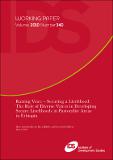| dc.identifier.citation | Brocklesby, M.A., Hobley, M. and Scott-Villiers, P. (2010) 'Raising Voice: Securing a Livelihood: The Role of Diverse Voices in Developing Secure Livelihoods in Pastoralist Areas in Ethiopia', IDS Working Paper 340, Brighton: IDS | en_GB |
| dc.description.abstract | This paper is concerned with the workings of voice among pastoralists in Ethiopia. It documents how diverse pastoralist men and women – young and old, rich and poor – call on one another and on representatives and officials in efforts to achieve cooperation and influence. Diverse pastoralists explain how successful voice is the result of interconnectedness and opportunity. Individual influence varies with a speaker’s social and political connections, with his or her determination, skill and experience, and as a consequence of geography and politics. In this study we learned that to be successful as a pastoralist in Ethiopia is to be ‘competent’ and to be competent is to have voice. People want to build capabilities to develop and manage assets, make demands, and secure and give support. Competence can be appreciated in their mobility, visibility, audibility and action: moving to watering and grazing places at the right time, bringing up children and managing the household well, being seen doing business in town, speaking effectively at clan and government meetings, being generous in welfare and wise in justice. Competence and voice are the basis of wealth and a bulwark against hard times, going beyond ideas of social, economic or political capital to embrace Amartya Sen’s notion of capability and agency, constantly renewed in interconnection and discussion (Sen 1999). In speaking, people are seeking binding responses, although often all they get are false assurances or rebuff. Poor pastoralists, clustering in increasing numbers around the edges of settlements, say that they are becoming powerless objects of state welfare, disconnected and unable to regain competence, still less contribute to society’s wellbeing. The response of pastoralist leaders has been to increase the level of engagement between different pastoralists, while increasing the intensity of their public engagements with the state. | en_GB |

